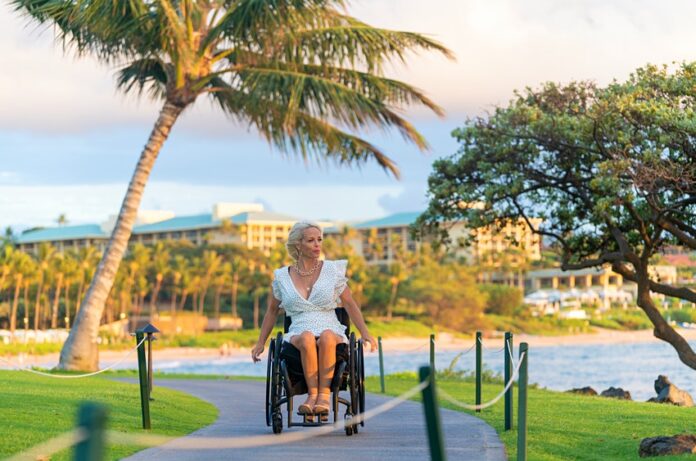Planning travel to Hawaii, a destination that tops many a tropical vacation bucket list, takes consideration. That the archipelago exists in the middle of the Pacific Ocean quite literally thousands of miles from its two nearest land masses — Alaska and Japan — having a curated list of things to do can help maximize your trip on the ground.
For travelers traversing the world in a wheelchair and/or with sensory challenges that need to be accounted for, there are extra considerations to ensure a safe and worthwhile experience. Consider this your primer to accessible travel in the Hawaiian Islands, from Oahu to Hawaii Island.
Accessible travel to Hawaii: things to do before you go
From booking accommodations to giving advance warning of furry travel companions, there are a handful of things to take care of well in advance of your trip.
Airport assistance is available
Hawaii’s most-visited islands are Oahu (HNL), Maui (OGG), Kauai (LIH), and Hawaii Island (Kona airport, KOA; Hilo airport, ITO). Each one of its airports offers terminal to curbside assistance for travelers with various mobility, visual, and hearing needs.

Use filters to book appropriate accessible accommodation
Major hotel booking sites such as Booking.com and alternative accommodation sites like Airbnb have search filters to identify accessibility needs. For example, a search for accessible hotels on Maui on Booking.com lists 18 hotels in Lahaina (Ka’anapali Beach Hotel, Sheraton Maui Resort & Spa) and 13 hotels in Wailea including Four Seasons Resort Maui at Wailea, and Wailea Beach Villas.
On Airbnb, filter for accessible features like a flat path to the front door, wide doorways and hallways, fixed grab bars in the bathroom, and step-free access to common areas.
Submit paperwork for service dogs to travel in advance
Travelers jet-setting with service and guide dogs should submit all required paperwork to the state’s Rabies Quarantine Branch at least ten days ahead of travel. Upon arrival in Hawaii, service and guide dogs must pass inspection and compliance at Airport Animal Quarantine Holding Facility or upon advance request, in the airport terminal. Note that Daniel K. Inouye Airport in Honolulu is the only port of entry for all dogs and cats coming to the islands.
Give advance notice of accessibility needs to car rental companies
With advance, notice car rental companies located at all major island airports accommodate accessibility needs. They can also deliver your rental to the airport terminal.
Oahu’s TheBus, Kauai’s Kauai Bus, Hawaii Island’s Hele-On bus service, and Maui’s Maui Bus are all wheelchair-accessible and operate paratransit service. Call to request paratransit transport.
Get more travel inspiration, tips and exclusive offers sent straight to your inbox with our weekly newsletter.

Accessible experiences: things to do once you get to Hawaii
There are many self-guided and organized recreational and leisure experiences accessible to those with varying mobilities and sensory needs throughout the major Hawaiian islands.
Many beaches are wheelchair-accessible
Many beaches on Oahu, Maui, Kauai and Hawaii Island feature accessible parking, all-terrain wheelchair rentals, and beach mats for sand access. The state recognizes disabled parking placards from other states.
Some Hawaii Island and Maui beaches are accessible, with more information from their respective departments of recreation.
There are a few accessible trails across the islands
For more information about the Hawaiian Islands’ accessible trails, try the Department of Land and Natural Resources, Na Ala Hele Trails and Access Program’s contact page. The Department’s interactive Hawaii Trails map displays three accessible trails using the “Accessible” filter option in the Activities section under Advanced Search — Kanealole Trail and Maunalaha Trail in Honolulu, on the island of Oahu, and Ohai Loop Trail and Overlook on Maui. More information about Hawaii’s recreational trails is also available on the OuterSpacial app. The app includes search filters for wheelchair-, hearing impaired-, and visually impaired-friendly outdoor activities.

Which island in Hawaii is best for accessible travel?
Experience Hawaiian culture at accessible venues on Oahu
On Oahu’s rural North Shore The Polynesian Cultural Center accommodates a range of mobility, visual and hearing access needs. There’s a wealth of activities to explore — from visiting island “villages” such as Tonga, Fiji, and Samoa to luau dinner shows. In 2021, the Cultural Center announced Master Chef restaurateur and Hawaii Food and Wine Festival regular, Graham Elliott, as Executive Chef of its Pounders restaurant, who also influences its luau and buffet menus.
In Honolulu’s Chinatown neighborhood, the historic Hawaii Theatre built in 1922 accommodates wheelchair users and offers listening devices. During its tenure, the Theatre has hosted numerous live musical, dance and comedic performances. Similarly, Blue Note Hawaii is a live performance venue and a popular place to catch live Hawaiian, Jazz and R&B music, that offers accessible seating.
Tour companies in Kauai cater to travelers with limited mobility
Kauai’s swaths of undeveloped landscapes make it a go-to island destination for immersive eco-adventures, even for those with various mobility needs. Kipu Ranch Adventures makes accommodations on a case-by-case basis for its ATV and off-road tours. Its three-hour signature off-road ranch tour rumbles through Huleia Valley as well as past cattle, wild pigs, chickens and peacocks. At Kauai Backcountry Adventures, its serene mountain tubing tour through a former sugar plantation irrigation system can accommodate guests with disabilities and limited mobility, though parts of the tour do require climbing up and down stairs. The company recommends calling ahead in the event additional staff need to be scheduled to help provide a comfortable experience.
Red dirt-pigmented Waimea Canyon (often called “The Grand Canyon of the Pacific”) and Wailua Falls are accessible via paved parking and viewing areas for more passive sightseeing.
Maui is home to several accessible wildlife experiences, including scuba diving
Located between Kihei and Maalaea towns, Kealia Pond Coastal Boardwalk sits within a National Wildlife Refuge and offers a mile-long, wheelchair-accessible boardwalk along Maalaea Bay. Use the interpretive signage to spot native (and endangered) Hawaiian birds like the Hawaiian stilt, with its long pink legs and Hawaiian coot, featuring a distinct white bill and dark body.
Lahaina Divers is equipped to guide accessible scuba diving experiences from Molokini Crater to Western Maui’s Turtle Reef. Staff hold certifications with the Handicapped Scuba Association (HSA).
Wheelchair-friendly Maui Ocean Center’s Humpbacks of Hawaii exhibit and 3D theater opened in 2019. Roll along to whales’ migration route from Alaska to Hawaii, compose your own whale song, and learn about the role marine life plays in Hawaiian culture. A fun fact: the exhibit was built in the shape and size to fit a grown female humpback whale. Complimentary wheelchairs are available on a first-come, first-served basis, and service dogs are welcome.

There are accessible tours and trails on Hawaii Island (Big Island)
The best way to navigate Hawaii Island’s Volcanoes National Park includes an initial stop at the Kilauea Visitor Center. There, wheelchairs are available for use, as well as information on the best accessible trails and viewpoints, like much of the Ha’akulamanu (Sulphur Banks) Trail and Kilauea Overlook. American Sign Language interpretation can be arranged two weeks prior to visiting if you call (808) 985 6011. The island’s volcanic activity makes it the youngest and largest of the main islands.
Body Glove’s 2.5-hour whale watching tour departs from Kona December through April and offers chance opportunities to also spot spinner dolphins, manta rays, and sea turtles. It also hosts a sunset cruise with live music and cocktails. A customized boarding ramp accommodates manual and electric scooters, while the lower deck of its catamarans are fully accessible. Accessible parking is available on a first-come, first-served basis.
Blue Hawaiian runs helicopter tours over the Big Island, Oahu, Maui, and Kauai. Custom chairlifts help passengers under 250 pounds get into and out of the helicopters.
Further services and resources for travelers with disabilities
Escape the ordinary and discover the extraordinary! From bustling cities to serene landscapes, every journey begins with a single step—let us guide yours. Enjoy curated itineraries, hidden gems, and hassle-free bookings designed for explorers at heart. Whether it's a weekend getaway or a globe-trotting adventure, your Next unforgettable experience is just a click away.










